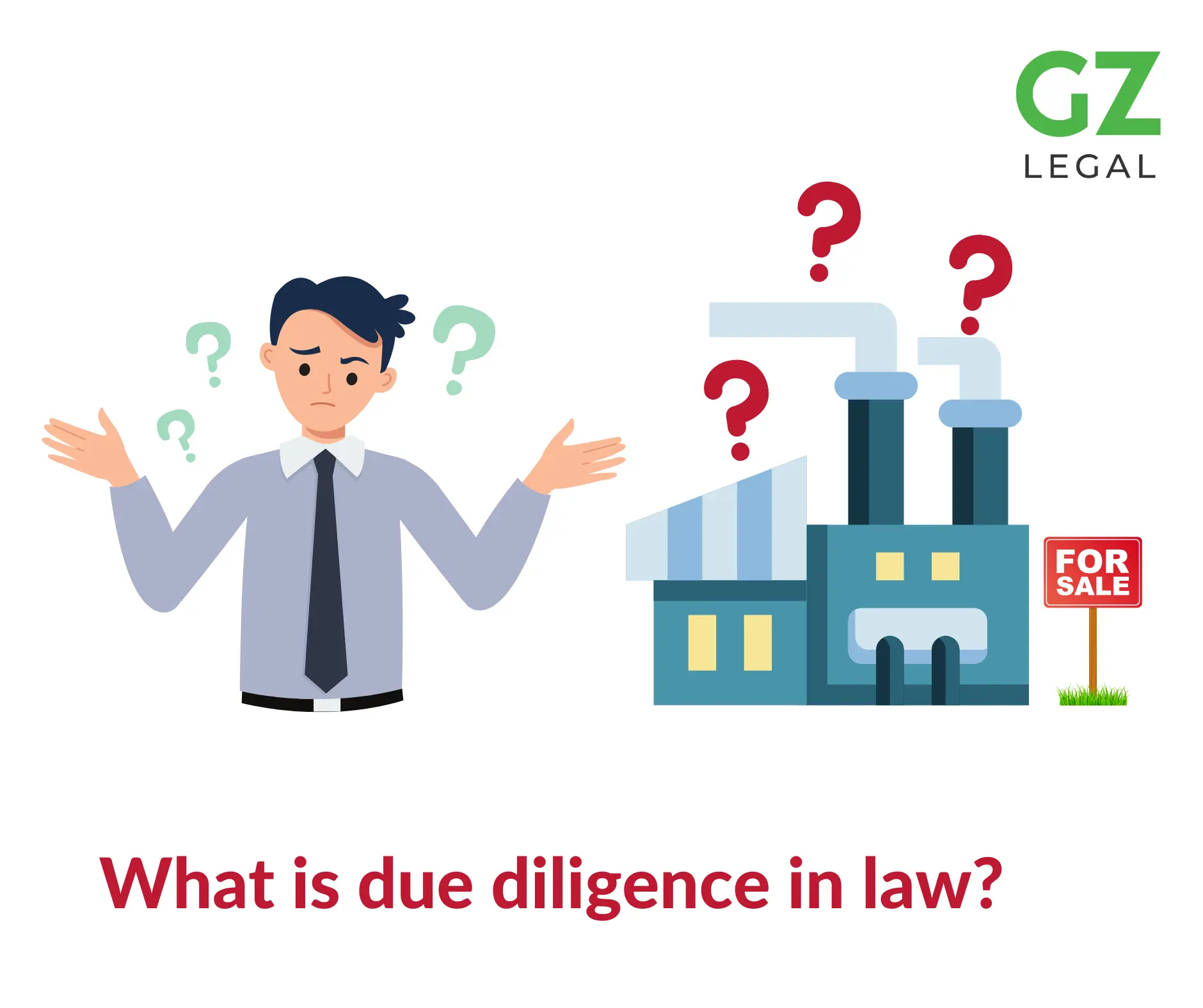Malcolm ZoppiSun Oct 15 2023
What is Due Diligence in Law?
This article looks at the importance of due diligence in the context of a business acquisition.

What is Due Diligence in Law?
Introduction to Due Diligence in Law
Before entering into any important investment, whether it’s acquiring a company or its underlying business, purchasing real estate or intellectual property rights, or some other commercial arrangement, you should conduct due diligence. This entails investing time and effort into obtaining as much detailed information as possible in order for you to make a wise and informed decision before spending your hard earned money.
For the purposes of this article, we will look at the importance of due diligence in the context of a business acquisition, although its principles are applicable for a range of commercial investments.
The article will explain what’s involved in the due diligence process, its benefits, and dangers of failing to perform due diligence, so that you are well equipped to proceed with the business deal with confidence.
Definition of Due Diligence
Due diligence is a legal concept that refers to the efforts made by a party, prior to entering into a business transaction, to ensure that all necessary information has been gathered and assessed.
The due diligence process requires that all relevant parties involved examine and review relevant information related to the transaction, such as financial records, intellectual property rights, contracts and other documents. This helps ensure that any risks associated with the deal are properly identified and addressed at an early stage.

Due diligence is an important process for both parties involved in a business transaction. It ensures that all parties involved are fully aware of the risks associated with the deal before they enter into an agreement. Without due diligence, parties may be unaware of potential liabilities or risks until after the transaction has been completed.
Examples of A Legal Due Diligence Process
The due diligence process typically involves investigating your target business in these six key areas:
Financial Due Diligence
- Obtain annual reports to assess company finances. If they are a limited company, they can be accessed freely on Companies House, though beware these could be out of date at the time of inspection.
- Reviewing financial statements, company accounts, its balance sheet, profitability forecasts, budgets and other financial-related documents.
- Identifying any charges or loan agreements associated with the company.
- Examining tax returns and any potential liabilities related to taxation.
- Conduct a shareholder value analysis: Identify the current shareholders, what percentage they own, the value of their shares and any shareholder agreement in place.
- Depreciation / amortisation issues.
Legal / Compliance
- Assessing any legal issues concerning the business such as contracts, compliance with regulations and pending litigation issues.
- Making sure that all parties have the necessary authority to carry out the transaction.
- Any permits or licenses required to operate the business.
- Records of regulatory matters and regulatory compliance.
- What insurance policies are in place. Have there been any historical claims?
- Health and safety procedures.
- Are environmental issues a concern in the business?
Operational
- Conduct a detailed review of the business’ products and/or services, profit margins, its sales processes, manufacturing process and any distribution arrangements.
- Reviewing key third party business contracts in the supply chain.
- Who are the key people in the business currently? Are they vital to retain to ensure its ongoing success?
- Ensuring the target company’s culture, values and current practices are a suitable fit for you or your current business.
Company Assets
- Assessing the value and status of any plant, machinery or other equipment.
- Reviewing any freehold or leasehold property the business owns.
- Investigating the status of IP assets such as trademarks, copyrights and patents.
Employees
- Conducting a detailed assessment of the current workforce. Number of employees, their job roles, salaries, employee benefits, etc.
- Experience of senior board members and leadership team.
- Arrangements with freelance business partners, contractors, external advisors, consultants and other third parties.
- Pension plan policies.
- Are there any ongoing or historical employment complaints, disputes, or compensation claims?
- Employee culture, job satisfaction, retention rates.
Marketing
- Reviewing the track record and effectiveness of any previous marketing campaigns.
- Marketing budgets.
- How much goodwill does the business have? What is the public’s perception of the company?
- Investigate any press releases or reports relating to the company.
Taking reasonable care to conduct a thorough and detailed due diligence investigation by addressing these aspects should provide you with a comprehensive picture of your target company. Though I must stress that due diligence can take many other forms; the list above is provided solely by way of example and is by no means intended as a complete due diligence checklist suitable for every situation!
The due diligence process should leave no stone unturned, and it will be the role of a corporate lawyer to compile the due diligence findings into a due diligence report.
Benefits of Undertaking Legal Due Diligence For Business Transactions
With your due diligence report in hand, you should now be in a position to assess risk and weigh it up against the benefits before committing to the purchase.
One key benefit of conducting your due diligence investigations early on in the negotiations is that if the due diligence process has identified particular problem areas, you will be in a stronger bargaining position to negotiate the purchase price down or secure promises from the seller in the in the form of warranties or indemnities to help manage that risk.
Other benefits of undertaking due diligence prior to making a business investment include:
- Ensuring that all parties involved in the deal are fully aware of any potential liabilities, risks or commitments they may be making;
- Building a trusting and productive business relationship with the target business owner and/or leadership team;
- Protection from any unexpected costs or losses associated with the deal;
- Identifying and resolving any issues or concerns before the deal is finalised;
- Providing a clear understanding of any financial or legal obligations associated with the deal; and
- Gaining an overall better understanding of the target company before making a decision.

Taking the time to properly undertake due diligence means that business owners can protect themselves from any potential liabilities or losses associated with the transaction and gain a clear understanding of their financial and legal obligations. This can help to ensure that business transactions are conducted successfully and efficiently, with all parties involved fully aware of any risks associated with the deal.
Common Pitfalls Associated with Neglecting to Perform Legal Due Diligence
Neglecting to perform due diligence can lead to costly and time-consuming issues that may have been avoided had the process been undertaken. Common pitfalls associated with not undertaking due diligence include:
- Missing out on key information or documents related to the company;
- Discovering hidden risks or liabilities after the deal is complete;
- Unforeseen financial obligations arising from the acquisition;
- Potential litigation or disputes arising as a result of an incomplete understanding of the transaction; and
- Non-compliance with applicable laws and regulations.
It is essential that due diligence is undertaken prior to entering into any business transaction in order to protect all parties involved and ensure that the transaction is conducted efficiently and successfully. This is especially important when dealing with large sums of money or complex transactions in order to protect all parties from potential liabilities or losses.
Conclusion on Due Diligence in Law
Due diligence is an important aspect of any legal transaction, as it helps to ensure that all parties have made a fully informed decision before entering into a business agreement. Due diligence also helps protect both parties from potential liabilities or damage by providing them with a clear understanding of the commitments they are making when engaging in the transaction.
Often, due diligence takes considerable time and effort, and the process should be conducted thoroughly and with the help of qualified legal professionals and technical experts to ensure the best outcome for all parties involved.
I hope you found this due diligence article helpful! For further information, please speak to one of our corporate lawyers here at GZ Legal who will be able to guide you guide you through the due diligence process, tailored to your needs. You may also find it useful to read our related blogs in this area; buying a business, seller financing, selling a company, and share purchase agreements.
Find out more!
If you want to read more in this subject area, you might find some of our other blogs interesting:
- Step-by-Step Guide on How to Transfer Shares to a Holding Company
- Breach of Settlement Agreement: Consequences and Remedies Explained
- Who Gets the Money When a Company is Sold?
- What is a Counter Offer in Contract Law? Explained Simply and Clearly
- Understanding the Costs: How Much Do Injunctions Cost in the UK?
This document has been prepared for informational purposes only and should not be construed as legal or financial advice. You should consult with appropriate professionals before conducting due diligence or buying a business. Additionally, this document is not intended to prejudge the legal, financial or tax position of any person buying a business or conducting due diligence.
